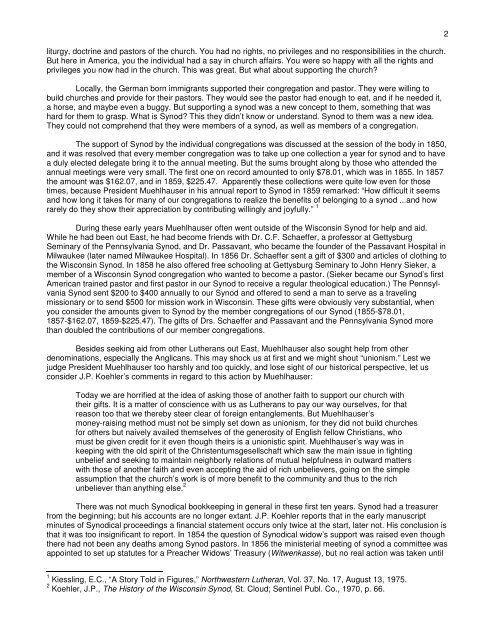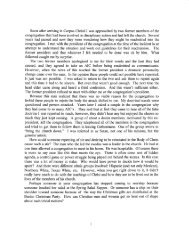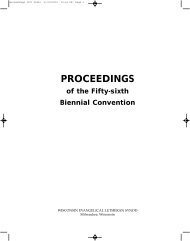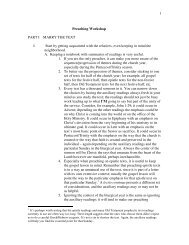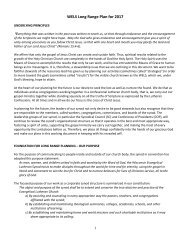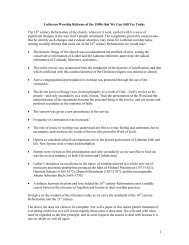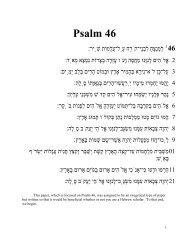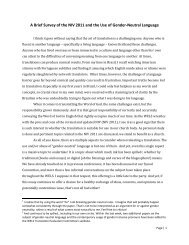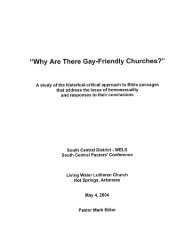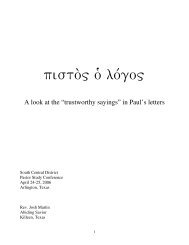A History of the WELS - The South Central District
A History of the WELS - The South Central District
A History of the WELS - The South Central District
You also want an ePaper? Increase the reach of your titles
YUMPU automatically turns print PDFs into web optimized ePapers that Google loves.
liturgy, doctrine and pastors <strong>of</strong> <strong>the</strong> church. You had no rights, no privileges and no responsibilities in <strong>the</strong> church.<br />
But here in America, you <strong>the</strong> individual had a say in church affairs. You were so happy with all <strong>the</strong> rights and<br />
privileges you now had in <strong>the</strong> church. This was great. But what about supporting <strong>the</strong> church?<br />
Locally, <strong>the</strong> German born immigrants supported <strong>the</strong>ir congregation and pastor. <strong>The</strong>y were willing to<br />
build churches and provide for <strong>the</strong>ir pastors. <strong>The</strong>y would see <strong>the</strong> pastor had enough to eat, and if he needed it,<br />
a horse, and maybe even a buggy. But supporting a synod was a new concept to <strong>the</strong>m, something that was<br />
hard for <strong>the</strong>m to grasp. What is Synod? This <strong>the</strong>y didn’t know or understand. Synod to <strong>the</strong>m was a new idea.<br />
<strong>The</strong>y could not comprehend that <strong>the</strong>y were members <strong>of</strong> a synod, as well as members <strong>of</strong> a congregation.<br />
<strong>The</strong> support <strong>of</strong> Synod by <strong>the</strong> individual congregations was discussed at <strong>the</strong> session <strong>of</strong> <strong>the</strong> body in 1850,<br />
and it was resolved that every member congregation was to take up one collection a year for synod and to have<br />
a duly elected delegate bring it to <strong>the</strong> annual meeting. But <strong>the</strong> sums brought along by those who attended <strong>the</strong><br />
annual meetings were very small. <strong>The</strong> first one on record amounted to only $78.01, which was in 1855. In 1857<br />
<strong>the</strong> amount was $162.07, and in 1859, $225.47. Apparently <strong>the</strong>se collections were quite low even for those<br />
times, because President Muehlhauser in his annual report to Synod in 1859 remarked: “How difficult it seems<br />
and how long it takes for many <strong>of</strong> our congregations to realize <strong>the</strong> benefits <strong>of</strong> belonging to a synod ...and how<br />
rarely do <strong>the</strong>y show <strong>the</strong>ir appreciation by contributing willingly and joyfully.” 1<br />
During <strong>the</strong>se early years Muehlhauser <strong>of</strong>ten went outside <strong>of</strong> <strong>the</strong> Wisconsin Synod for help and aid.<br />
While he had been out East, he had become friends with Dr. C.F. Schaeffer, a pr<strong>of</strong>essor at Gettysburg<br />
Seminary <strong>of</strong> <strong>the</strong> Pennsylvania Synod, and Dr. Passavant, who became <strong>the</strong> founder <strong>of</strong> <strong>the</strong> Passavant Hospital in<br />
Milwaukee (later named Milwaukee Hospital). In 1856 Dr. Schaeffer sent a gift <strong>of</strong> $300 and articles <strong>of</strong> clothing to<br />
<strong>the</strong> Wisconsin Synod. In 1858 he also <strong>of</strong>fered free schooling at Gettysburg Seminary to John Henry Sieker, a<br />
member <strong>of</strong> a Wisconsin Synod congregation who wanted to become a pastor. (Sieker became our Synod’s first<br />
American trained pastor and first pastor in our Synod to receive a regular <strong>the</strong>ological education.) <strong>The</strong> Pennsylvania<br />
Synod sent $200 to $400 annually to our Synod and <strong>of</strong>fered to send a man to serve as a traveling<br />
missionary or to send $500 for mission work in Wisconsin. <strong>The</strong>se gifts were obviously very substantial, when<br />
you consider <strong>the</strong> amounts given to Synod by <strong>the</strong> member congregations <strong>of</strong> our Synod (1855-$78.01,<br />
1857-$162.07, 1859-$225.47). <strong>The</strong> gifts <strong>of</strong> Drs. Schaeffer and Passavant and <strong>the</strong> Pennsylvania Synod more<br />
than doubled <strong>the</strong> contributions <strong>of</strong> our member congregations.<br />
Besides seeking aid from o<strong>the</strong>r Lu<strong>the</strong>rans out East, Muehlhauser also sought help from o<strong>the</strong>r<br />
denominations, especially <strong>the</strong> Anglicans. This may shock us at first and we might shout “unionism.” Lest we<br />
judge President Muehlhauser too harshly and too quickly, and lose sight <strong>of</strong> our historical perspective, let us<br />
consider J.P. Koehler’s comments in regard to this action by Muehlhauser:<br />
Today we are horrified at <strong>the</strong> idea <strong>of</strong> asking those <strong>of</strong> ano<strong>the</strong>r faith to support our church with<br />
<strong>the</strong>ir gifts. It is a matter <strong>of</strong> conscience with us as Lu<strong>the</strong>rans to pay our way ourselves, for that<br />
reason too that we <strong>the</strong>reby steer clear <strong>of</strong> foreign entanglements. But Muehlhauser’s<br />
money-raising method must not be simply set down as unionism, for <strong>the</strong>y did not build churches<br />
for o<strong>the</strong>rs but naively availed <strong>the</strong>mselves <strong>of</strong> <strong>the</strong> generosity <strong>of</strong> English fellow Christians, who<br />
must be given credit for it even though <strong>the</strong>irs is a unionistic spirit. Muehlhauser’s way was in<br />
keeping with <strong>the</strong> old spirit <strong>of</strong> <strong>the</strong> Christentumsgesellschaft which saw <strong>the</strong> main issue in fighting<br />
unbelief and seeking to maintain neighborly relations <strong>of</strong> mutual helpfulness in outward matters<br />
with those <strong>of</strong> ano<strong>the</strong>r faith and even accepting <strong>the</strong> aid <strong>of</strong> rich unbelievers, going on <strong>the</strong> simple<br />
assumption that <strong>the</strong> church’s work is <strong>of</strong> more benefit to <strong>the</strong> community and thus to <strong>the</strong> rich<br />
unbeliever than anything else. 2<br />
<strong>The</strong>re was not much Synodical bookkeeping in general in <strong>the</strong>se first ten years. Synod had a treasurer<br />
from <strong>the</strong> beginning; but his accounts are no longer extant. J.P. Koehler reports that in <strong>the</strong> early manuscript<br />
minutes <strong>of</strong> Synodical proceedings a financial statement occurs only twice at <strong>the</strong> start, later not. His conclusion is<br />
that it was too insignificant to report. In 1854 <strong>the</strong> question <strong>of</strong> Synodical widow’s support was raised even though<br />
<strong>the</strong>re had not been any deaths among Synod pastors. In 1856 <strong>the</strong> ministerial meeting <strong>of</strong> synod a committee was<br />
appointed to set up statutes for a Preacher Widows’ Treasury (Witwenkasse), but no real action was taken until<br />
2<br />
1 Kiessling, E.C., “A Story Told in Figures,” Northwestern Lu<strong>the</strong>ran, Vol. 37, No. 17, August 13, 1975.<br />
2 Koehler, J.P., <strong>The</strong> <strong>History</strong> <strong>of</strong> <strong>the</strong> Wisconsin Synod, St. Cloud; Sentinel Publ. Co., 1970, p. 66.


